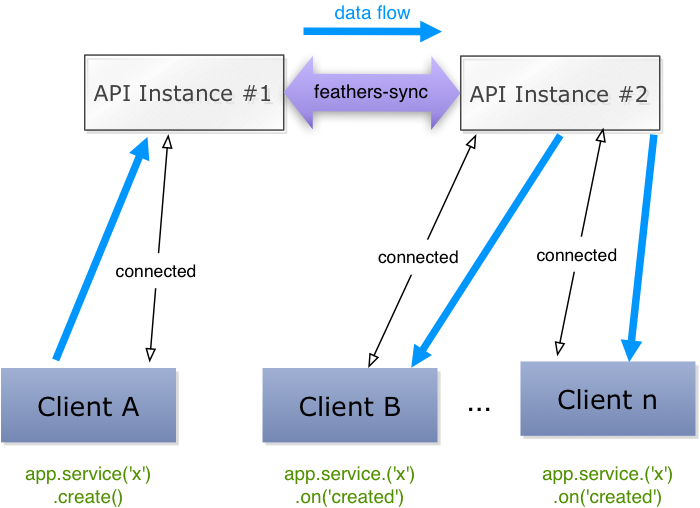feathers-sync
v3.0.3
Published
Feathers
Downloads
8,932
Readme
Feathers sync
Synchronize service events between application instances
About
When running multiple instances of your Feathers application (e.g. on several Heroku Dynos), service events (created, updated, patched, removed and any custom defined events) do not get propagated to other instances.
feathers-sync uses a messaging mechanism to propagate all events to all application instances. It currently supports:
This allows to scale real-time websocket connections to any number of clients.
Usage
The application initialized in the following example will use the local feathers-sync database and sync collection and share service events with every other instance connected to the same database:
const feathers = require('@feathers/feathers');
const sync = require('feathers-sync');
const app = feathers();
app.configure(
sync({
uri: 'redis://localhost:6379',
})
);
app.use('/todos', todoService);Note that configuring sync should happen before configuring services
app.sync
When set up, app.sync will contain the following information:
type- The adapter type (e.g.redisoramqp)ready- A promise that resolves when the synchronization mechanism is ready
app.sync.ready.then(() => {
// Do things here
});Disabling synchronization
feathers-sync can be disabled on the service method call level in a hook by setting the require('feathers-sync').SYNC property on the hook context to false:
const { SYNC } = require('feathers-sync');
app.service('messages').hooks({
after: {
create(context) {
// Don't synchronize if more than 1000 items were created at once
if (context.result.length > 1000) {
context[SYNC] = false;
}
return context;
},
},
});Adapters
feathers-sync can be initialized either by specifying the type of adapter through the uri (e.g. redis://localhost:6379) or using e.g. sync.redis directly:
// Configure Redis
app.configure(
sync({
uri: 'redis://localhost:6379',
})
);
app.configure(
sync.redis({
db: redisInstance,
})
);
// Configure Redis using an existing redisClient
app.configure(
sync.redis({
redisClient: redisClient,
})
);Redis
uri- The connection string (must start withredis://)key- The key under which all synchronization events will be stored (default:feathers-sync)redisClient- An existing instance of redisClientredisOptions- Redis client options
AMQP
uri- The AMQP connection string (e.g.amqp://guest:guest@localhost:5672).key(default:feathers-sync) - The name exchange where sync messages will be publishedamqpConnectionOptions- AMQP connection options
NATS
uri- The connection string (examplenats://)key(default:feathers-sync) - The name of subject where sync messages will be publishednatsConnectionOptions- NATS connection options
How it works

Caveat: Listening to service events
With feathers-sync enabled all events are going to get propagated to every application instance. This means, that any event listeners registered on the server should not perform any actions that change the global state (e.g. write something into the database or call to an external API) because it will end up running multiple times (once on each instance). Instead, event listeners should only be used to update the local state (e.g. a local cache) and send real-time updates to all its clients.
If you need to perform actions, for example setting up a first blog post after a new user has been created, add it to the service method itself or use a Feathers hook (both of which will only run once on the instance that is handling the request).
Custom Serializer / Deserializer
Event data are serialized and deserialized using JSON.stringify and JSON.parse. This could pose a problem if the event data contains circular reference or has Date values (Date is not a valid JSON value (source) and will be serialized to a string). You can provide a custom serializer/deserializer like this:
// BSON can serialize / deserialize `Date` values.
const bson = require('bson');
app.configure(
sync({
uri: 'redis://localhost:6379',
// Replies will be sent to callbacks as Buffers instead of Strings for bson.deserialize to work.
redisOptions: { return_buffers: true },
serialize: bson.serialize,
deserialize: bson.deserialize,
})
);
RedisandAMQPcan support binary serialization / deserialization (i.e.Bufferdata).NATScurrently does not support custom serialization / deserialization/
Writing custom adapters
feathers-sync allows to implement custom adapters using the sync-in and sync-out events on the application:
const { core } = require('feathers-sync');
const myMessagingService = {
publish(data) {
// send data here
},
subscribe(callback) {
// subscribe to message queue and emit data
},
};
module.exports = (config) => {
// If adapter supports configurable serializer / deserializer (defaults to `JSON.stringfy` / `JSON.parse`)
const { deserialize, serialize } = config;
return (app) => {
app.configure(core);
app.sync = {
type: 'custom',
ready: new Promise((resolve, reject) => {
// resolve when client is ready
// reject on connection error
}),
serialize,
deserialize,
};
// Sent every time a service
app.on('sync-out', (data) => {
// Publish `data` to the message queue
myMessagingService.publish(data);
});
myMessagingService.subscribe((data) => {
// Send the synchronization event to the application
app.emit('sync-in', data);
});
};
};The data for the sync-in event should be in the same form as the one that is sent by sync-out (currently it includes { event, path, data, context }).
License
Copyright (c) 2021 Feathers contributors
Licensed under the MIT license.

